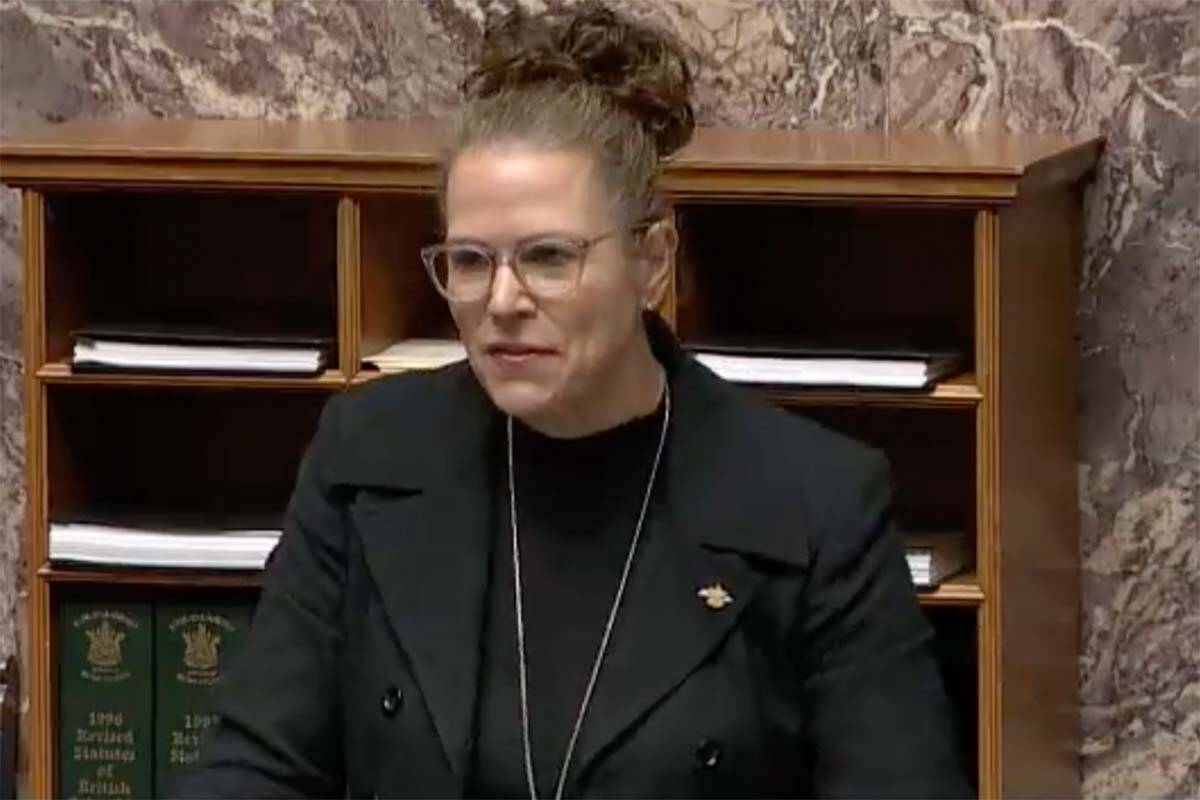CleanBC — the provincial government’s plan to lower greenhouse gas emissions by 40 per cent below 2007 levels by 2030 — came under fire during Question Period today as BC United accused the plan of being ineffective while hurting the provincial economy by making life more expensive.
But several ministers, starting with Premier David Eby himself, defended the plan in the face of climate change and accused the opposition of failing to support measures that would make life more affordable.
Central to BC United’s critique is an analysis from the Business Council of British Columbia. Drawing on government economic modelling, it argues that CleanBC would shrink the provincial economy by $28 billion by 2030. Real per capita income in 2030 would fall back to levels circa 2013.
BC United House Leader Todd Stone, MLA for Kamloops-South Thompson, dismissed CleanBC as “nothing more than a glossy brochure” covering up a “mishmash of regulations and taxes in the least affordable jurisdiction” in North America.
“The NDP’s so-called CleanBC scheme on a go-forward basis is a direct threat to the well-being of British Columbians,” Stone said. “(It) is projected to carve nearly $3 billion annually out of health care, is set to reduce household incomes by $11,000 per family per year and it will result in the loss of thousands of private sector jobs in B.C.”
Several BC United MLAs including Trevor Halford, MLA for Surrey-White Rock and Renee Merrifield, MLA Kelowna-Mission, offered variations on this theme in questioning the government’s commitment toward carbon taxation, while accusing the government of ignoring affordability concerns.
“To double down, at the NDP convention this weekend, the premier announced that despite every other premier and the federal NDP leader calling for carbon tax relief on home heating, he would not be,” Merrifield said.
BC United MLAs also said that the plan was not working, often citing criticisms from environmental groups as evidence of the plan’s ineffectiveness.
RELATED: Housing dominates ‘selectively aggressive’ premier’s first year in office
RELATED: Premier Eby: B.C. ‘won’t back down’ on carbon taxation
RELATED: BC United promises to remove provincial taxes for cars and home heating
Monday’s attack on CleanBC comes as Falcon is preparing to make a major policy announcement. It can also be read as a response to Eby’s speech at his party’s convention, during which he vowed that B.C. ‘won’t back down’ on taxing carbon.
Eby responded by accusing of BC United of hypocrisy in noting that the BC Liberals — BC United’s predecessor — introduced the carbon tax.
“I know that the other side of the house is desperate to justify their about-face on climate action,” Eby said. “It’s embarrassing. Their leader (Kevin Falcon) said bringing in the carbon tax was one of the proudest things ever. And now they say, ‘no, no, we don’t think it’s a good idea anymore.’ They will say anything to get elected.”
Eby also directly addressed Merrifield’s criticisms. “She comes from a community that almost burnt down this summer in a wildfire,” Eby said. “(Everybody) agrees (that fire) was a climate-related disaster,” he added.
Citing a list of statistics, Eby called B.C. an “economic and fiscal” leader. “They (BC United) are in a position of desperation, but I can’t let them make up their own facts,” he said. “We are creating more jobs, we are creating green jobs, we are taking climate action. But people are struggling and that’s why we have taken action to support them,” he added, pointing to various policy measures.
Eby said government will continue to address affordability issues, particularly on the issue of housing.
“(I) look forward to when (BC United) are called to account on the floor of this House for voting against every single housing affordability initiative we’re bringing forward as they stand up for investors and speculators and people who turned homes into hotels,” Eby said.
Environment Minister George Heyman, meanwhile, questioned the accuracy of BCBC’s analysis.
“The fact is that the BCBC assumed that there would be no development in a clean economy, no economic development on clean energy…and expansion of resource industries to provide decarbonized economies,” he said.
B.C., he added, has also reduced its emissions on a per-capita and absolute basis.
“Our plan is working,” he said. “Our plan will continue. Our plan will deliver what British Columbians want, which is reduced emissions, which is exactly what the party opposite failed to do when they were in government.”
@wolfgangdepner
wolfgang.depner@blackpress.ca
Like us on Facebook and follow us on Twitter.

